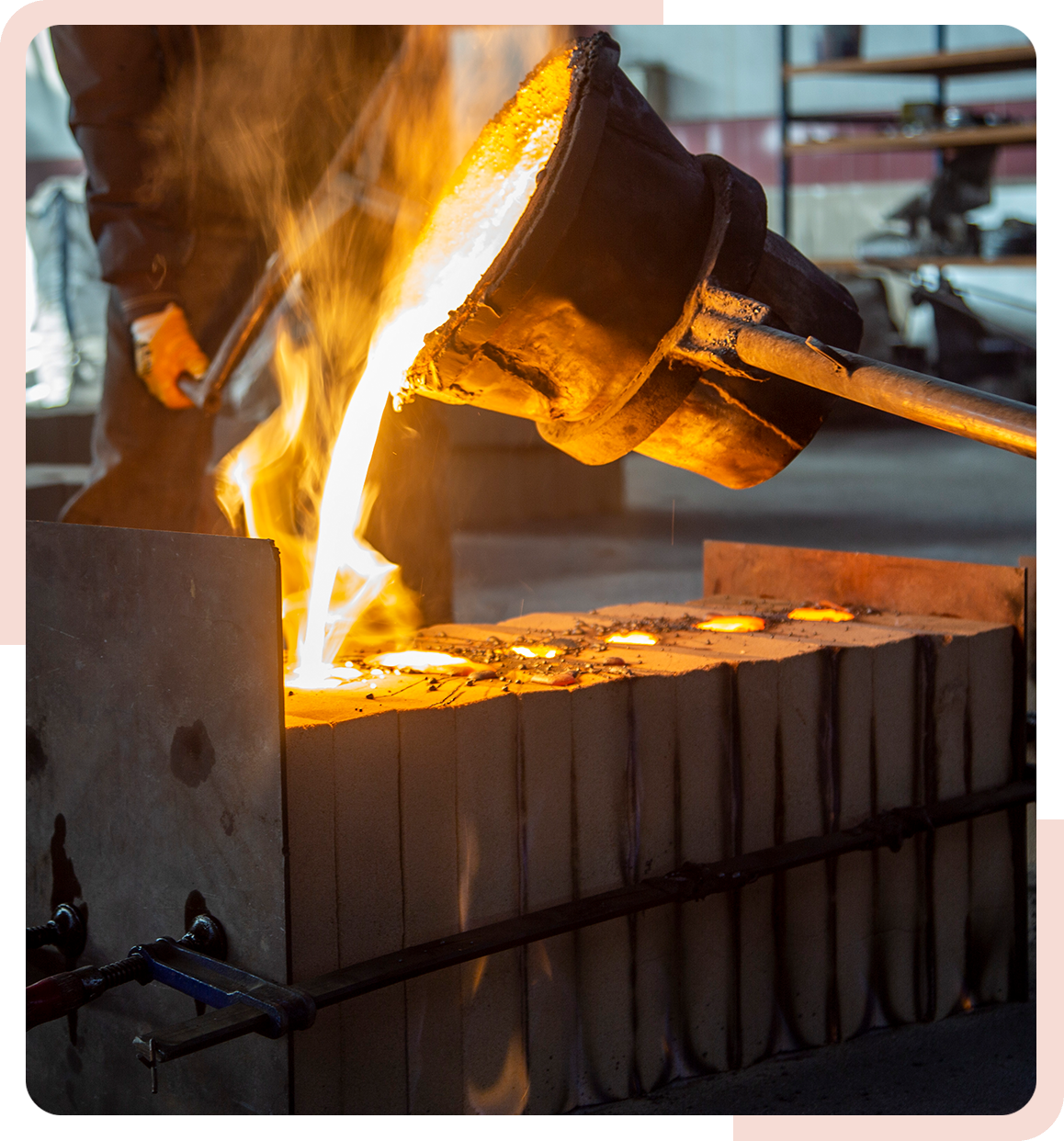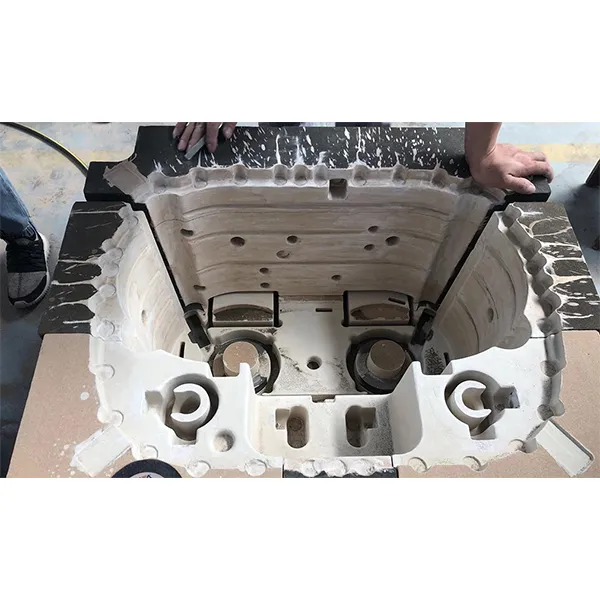Exploring the Innovative Procedures Behind Modern Aluminum Factory Workflow
Modern aluminum factory operations are going through significant transformation. Automation and AI are improving manufacturing techniques, improving both effectiveness and accuracy. The assimilation of 3D printing is simplifying mold and mildew development, while sustainability methods are becoming a lot more vital. Each of these improvements plays a crucial duty in redefining the sector. The implications of these changes extend past simple manufacturing performance. What obstacles and opportunities exist in advance for light weight aluminum factories in this developing landscape?
The Role of Automation in Light Weight Aluminum Foundries

Additionally, automation adds to enhanced security requirements within the shop atmosphere. By moving unsafe tasks to machines, human employees can concentrate on managerial duties and quality assurance, reducing the threat of mishaps. In addition, information analytics originated from automated procedures provide important understandings right into operational efficiency, leading to far better decision-making and continual improvement. As the demand for light weight aluminum items expands, the fostering of automation technologies will likely increase, even more transforming the landscape of light weight aluminum shop operations.
Innovations in Casting Technologies
Current improvements in casting innovations are transforming light weight aluminum shop operations. Innovations such as 3D printing combination, advanced alloy solutions, and automated process optimization are enhancing performance and item high quality. These growths are essential in satisfying the progressing needs of the market.
3D Printing Integration
Integrating 3D printing technology right into light weight aluminum foundry operations has transformed conventional casting methods, boosting both performance and accuracy. This innovative approach permits the fast production of intricate molds and cores, greatly decreasing lead times and material waste. By making use of additive production, factories can develop detailed geometries that were difficult or formerly tough to accomplish with conventional strategies. The adaptability of 3D printing additionally makes it possible for quick layout alterations, promoting an extra dexterous manufacturing process. In addition, this assimilation sustains the use of lightweight structures, which is significantly essential in industries such as auto and aerospace. As light weight aluminum shops continue to embrace 3D printing, they place themselves at the forefront of technological innovation, driving renovations in product top quality and operational abilities.
Advanced Alloy Formulations
The development of innovative alloy solutions has considerably boosted casting modern technologies in light weight aluminum factory procedures. These formulations incorporate various elements, such as copper, silicon, and magnesium, to enhance mechanical properties and thermal resistance. By tailoring the make-up of aluminum alloys, makers can attain details performance features that satisfy the needs of diverse applications, from automotive parts to aerospace frameworks. The usage of advanced alloys also contributes to reduced weight and enhanced toughness, which are vital consider modern-day engineering. In addition, developments in alloy growth make it possible for much better fluidness throughout casting, leading to enhanced surface coatings and lowered flaws. In general, advanced alloy solutions represent a substantial jump onward, placing aluminum shops to fulfill the progressing demands of different markets efficiently.
Automated Process Optimization
Advancements in casting innovations have actually led the way for automatic procedure enhancement in light weight aluminum shop procedures. By integrating advanced software and real-time information analytics, foundries can currently streamline manufacturing procedures and enhance high quality control. Automated systems check variables such as temperature level, stress, and air conditioning rates, permitting prompt adjustments that reduce problems and waste. Additionally, artificial intelligence formulas analyze historical performance data to anticipate excellent setups, consequently boosting performance and lowering cycle times. Robotics additionally play a considerable function, dealing with repeated jobs that enhance safety and security and accuracy. Generally, these developments not just drive operational effectiveness however additionally enable shops to satisfy the expanding need for top quality aluminum parts in various sectors.
Smart Production and Market 4.0 Combination
The assimilation of Smart Manufacturing and Market 4.0 within aluminum factories is transforming operational effectiveness. By leveraging IoT modern technologies, automation, and robotics, foundries can optimize manufacturing processes and reduce downtime. Additionally, data analytics provides vital understandings that enhance decision-making and drive continuous renovation.
IoT in Shop Workflow
As producers significantly embrace the Internet of Things (IoT), factory procedures are experiencing a transformative change in the direction of clever manufacturing and Market 4.0 combination. Aluminum Casting Company. IoT modern technologies make it possible for real-time information collection and evaluation, improving decision-making processes and operational efficiency. Sensors and connected tools check devices efficiency, product usage, and ecological problems, permitting proactive upkeep and source optimization. This connection cultivates a much more dexterous production atmosphere, where adjustments can be made quickly in feedback to market demands. In addition, IoT helps with improved traceability and quality assurance, as data from the whole manufacturing cycle can be quickly accessed and assessed. On the whole, the combination of IoT in foundry operations considerably improves efficiency and drives development in light weight aluminum manufacturing procedures
Automation and Robotics Combination
Automation and robotics integration is transforming light weight aluminum shop operations by boosting effectiveness and accuracy. This transformative approach improves procedures such as molding, pouring, and finishing, decreasing human mistake and raising result uniformity. By using innovative robot systems, shops can achieve greater manufacturing prices while keeping rigorous top quality requirements. Automated systems likewise make it possible for real-time monitoring and flexible control, enabling quick changes to production parameters. Additionally, the combination of robotics reduces labor costs and minimizes security threats associated with manual handling of molten metal. As foundries welcome clever production concepts fundamental in Sector 4.0, the synergy in between automation and robotics strengthens their one-upmanship, leading the way for sustainable growth and advancement in the aluminum spreading field.
Information Analytics for Performance
Using information analytics substantially improves effectiveness within light weight aluminum shop operations, lining up with clever production and Market 4.0 principles. By leveraging real-time data collection and evaluation, factories can monitor production processes, forecast tools failures, and optimize resource appropriation. This data-driven strategy promotes insightful decision-making, making it possible for supervisors to recognize bottlenecks and boost process. Additionally, predictive analytics empowers foundries to prepare for market demands, thereby reducing waste and ensuring timely item distribution. Assimilation of information analytics with IoT tools enhances operational exposure, promoting a proactive maintenance culture. Eventually, implementing these innovative analytical techniques not only improves performance yet likewise drives technology, positioning aluminum factories to meet the advancing demands of the industry while maintaining affordable edges in a quickly changing landscape.
Lasting Practices in Light Weight Aluminum Casting
While the aluminum spreading industry has traditionally encountered ecological challenges, several factories are currently embracing lasting practices to reduce their influence (aluminum casting). A substantial emphasis has actually been on recycling light weight aluminum scrap, which not just minimizes waste but likewise conserves power contrasted to primary aluminum production. Innovative melting technologies, such as induction heating systems, improve power performance and reduced greenhouse gas exhausts
In addition, shops are implementing closed-loop water supply to minimize water intake and reduce thermal pollution. The use of environment-friendly binders in mold-making procedures is getting grip, more reducing dangerous exhausts.
In addition, some centers are buying renewable power resources to power operations, aligning with worldwide sustainability objectives. By integrating these practices, the aluminum casting industry is evolving towards an extra environmentally liable future, demonstrating that financial development can exist together with ecological stewardship - Aluminum Foundry. These initiatives show a dedication to sustainability and the importance of ecological accountability in manufacturing
Quality Assurance Innovations
As the light weight aluminum casting sector breakthroughs in the direction of sustainability, the importance of quality assurance technologies becomes progressively noticeable. Modern aluminum foundries are adopting sophisticated technologies to boost their top quality assurance processes. Strategies such as real-time monitoring and data analytics permit makers to identify variances and flaws early in the get more info production cycle. Applying automated examination systems furnished with maker learning algorithms warranties that products satisfy strict top quality standards while minimizing human error.
In addition, the integration of non-destructive screening methods, such as radiographic and ultrasonic examinations, supplies deeper insights into the integrity of castings without damaging the product. These developments not just improve product dependability but additionally minimize waste, aligning with sustainability goals. In enhancement, the adoption of standardized quality structures helps streamline operations throughout various shops, assuring uniformity in output. Jointly, these advancements are reshaping high quality control, promoting a society of excellence within the aluminum spreading field.
Future Fads in Aluminum Foundry Procedures
What technologies exist ahead for aluminum shop procedures? The future of light weight aluminum shops is poised for improvement through developments in automation, expert system, and lasting methods. The combination of robotics and automated systems is anticipated to boost efficiency and precision in the casting processes, minimizing human mistake and labor expenses. Furthermore, AI-driven analytics will make it possible for real-time monitoring and predictive maintenance, maximizing functional efficiency and decreasing downtime.
Sustainability stays a focal point, with shops progressively embracing green practices, such as utilizing recycled light weight aluminum and establishing low-emission melting modern technologies. Technologies in 3D printing are also expected to reinvent mold-making, enabling intricate geometries and decreased product waste. As the market welcomes digitalization, data-driven decision-making will certainly come to be critical, allowing shops to react promptly to market needs. Jointly, these patterns promise to redefine light weight aluminum factory operations, making them extra reliable, lasting, and versatile to future difficulties.

Often Asked Concerns
What Precaution Are Carried Out in Aluminum Foundry Operations?
Light weight aluminum foundry procedures execute numerous safety and security steps, consisting of individual safety tools, air flow systems to take care of fumes, normal safety training, emergency reaction plans, and strict tracking of temperature and devices to avoid accidents and guarantee employee security.
How Do Shops Take Care Of Labor Force Training for New Technologies?

What Materials Are Typically Reused in Aluminum Foundries?
Aluminum shops generally reuse scrap aluminum, consisting of post-consumer products like drink containers, automobile parts, and building materials. This recycling procedure reduces waste and conserves sources, adding to an extra sustainable aluminum manufacturing sector.
How Does Light Weight Aluminum Casting Influence the Atmosphere?
Aluminum casting influences the environment with energy-intensive processes, greenhouse gas emissions, and potential regional pollution. However, developments in recycling and sustainable methods can reduce these effects, promoting a much more environmentally friendly method to light weight aluminum manufacturing.
What Are the Common Lead Times for Light Weight Aluminum Casting Projects?
Regular preparation for aluminum casting projects vary considerably, usually varying from two to six weeks. Elements influencing these timelines consist of complexity, order size, and product availability, influencing overall manufacturing schedules in factory operations.
Automation significantly plays an important role in light weight aluminum factories, boosting efficiency and accuracy in the manufacturing procedure. Improvements in casting modern technologies have paved the method for computerized procedure improvement in aluminum factory operations. Harnessing data analytics greatly improves effectiveness within aluminum shop operations, aligning with clever manufacturing and Market 4.0 concepts. A significant focus has actually been on recycling aluminum scrap, which not just reduces waste but additionally conserves power compared to main aluminum production. Light weight aluminum factories frequently reuse scrap aluminum, consisting of post-consumer items like beverage containers, automobile components, and building and construction materials.